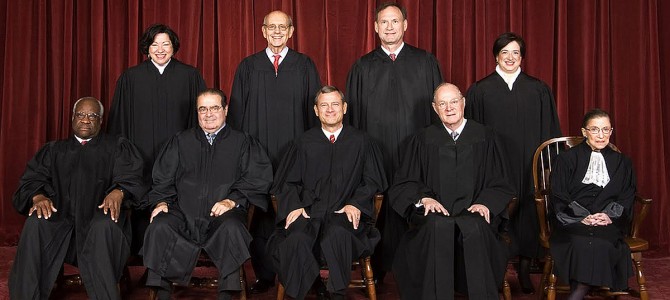
I do solemnly swear (or affirm) that I will support the Constitution of the United States, and the Constitution of the Commonwealth of Virginia, and that I will faithfully and impartially discharge all the duties incumbent upon me as______, according to the best of my ability (so help me God).
— Virginia Oath of Office
The governor, attorney general, and every circuit court clerk in Virginia takes this oath upon assuming office. Apparently, it means something quite different depending on which side of history your political preferences lie.
In January 2014, Attorney General Mark Herring announced he would no longer continue to defend in ongoing litigation in federal court Virginia’s constitutional amendment defining marriage as the union of a man and woman. After careful consideration, he concluded that the amendment violates the Equal Protection Clause of the Fourteenth Amendment of the U.S. Constitution. Following a trail already blazed by a number of other state attorneys general, his office then joined the plaintiffs in that case and asked the Supreme Court to find Virginia’s constitutional prohibition of same-sex marriage to be unconstitutional.
I Do What I Want
What received little publicity at the time of Herring’s announcement was that his personal interpretation of the Constitution was in direct contravention of the U.S. Supreme Court’s ruling from Baker v. Nelson, a 1972 case that established states have the right to decide what constitutes a marriage.
In fact, Baker so clearly established this precedent that the Supreme Court found it necessary to expressly overrule the case in its Obergefell decision this past summer. Thus, when Herring decided his personal interpretation of the Constitution was sufficient cause for him to refrain from using his office to enforce the law of the land, he was defying the Supreme Court’s power to bind his interpretation or force him to use his office to act in accordance with it.
Predictably, the public reaction to Herring’s decision was based almost entirely on whether his interpretation favored the political preferences of the citizen reacting. Proponents of same-sex marriage cheered, their opponents caterwauled. While this response may have been predictable, it is troublingly inconsistent with the public reaction witnessed recently with regard to the refusal of court clerks to provide marriage licenses; now each side of the political issue is trying to comfortably fit into the legal shoe his opponent was wearing last year.
Selective Enforcement Is for the Birds
Indisputably, the court clerks refusing to grant licenses to same-sex couples today are in violation of the Supreme Court’s Obergefell decision (and in the case of Kim Davis, direct violation of a federal District Court order). But equally as true, Herring and the other states’ attorneys general that acted in a like manner were violating the Supreme Court’s Baker precedent. So is one of these office-holders right and the other wrong? Does an attorney general inherently possess this prerogative to decline to enforce the law while a court clerk does not?
The answer, I think, is no. Both a circuit court clerk and an attorney general are independently elected officials, both take the same oath of office, and therefore both share the same obligation to support the Constitution. One cannot give the attorney general a pass and insist that the circuit court clerk comply without abandoning logical consistency.
Being an independently elected official makes the clerk a representative of the people, which is no small thing. She stands outside of the direct authority of the executive, legislative, or judicial branches, and the only recourse for removing her from office is impeachment or electing someone else.
More importantly, being an elected official entails agency. We don’t elect persons to positions that require only reflexive or automated tasks; we elect people to offices requiring the exercise of discretion and the authority to act or refrain from acting. While a clerk’s duties are certainly more ministerial than adjudicative or deliberative, she and the attorney general share the same primary duty to exercise their authority subject to one major condition: their support of the Constitution.
The Supreme Court Trumps the Constitution
That constitutional oath seems antiquated today—little more than a pro forma legal nicety, a small tradition that makes for a good public ceremony. But when a publicly elected official declines to perform an act otherwise required of her, that oath is anything but a shibboleth.
While Herring did not explicitly defend his actions by relying on his oath, his refusal to enforce the law makes no sense without this preeminent obligation. Similarly, while some clerks have cited religious scruples as the basis for their inaction, the better “higher power” ground for their refusal to act is that they took an oath that precedes their fealty to the judgment of the Supreme Court. To conclude otherwise would transform the oath of office into an oath of subscription to the United States Supreme Court.
Of course, this way madness lies, no? Our system cannot really tolerate that kind of authority in each elected official, can it? Perhaps. Maybe we should require subscription to the infallible rulings of the unelected nine from all other elected officials. But then let’s at least stop pretending that the Constitution means anything other than what the Supreme Court says it means, drop the oath of office, and make sure we hold every elected official to the same standard, not just the ones we disagree with.







